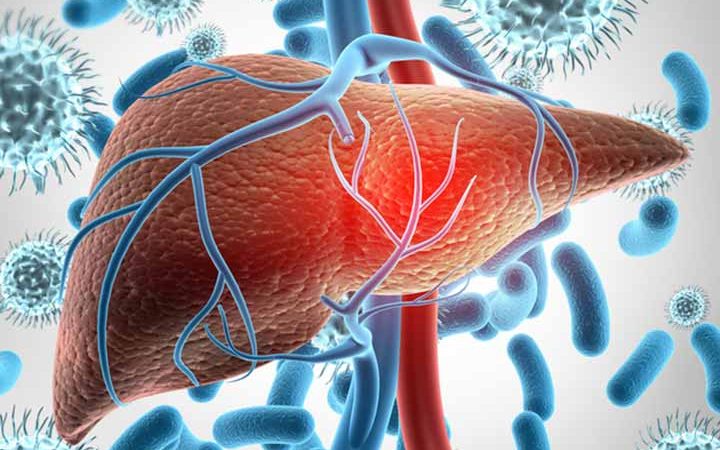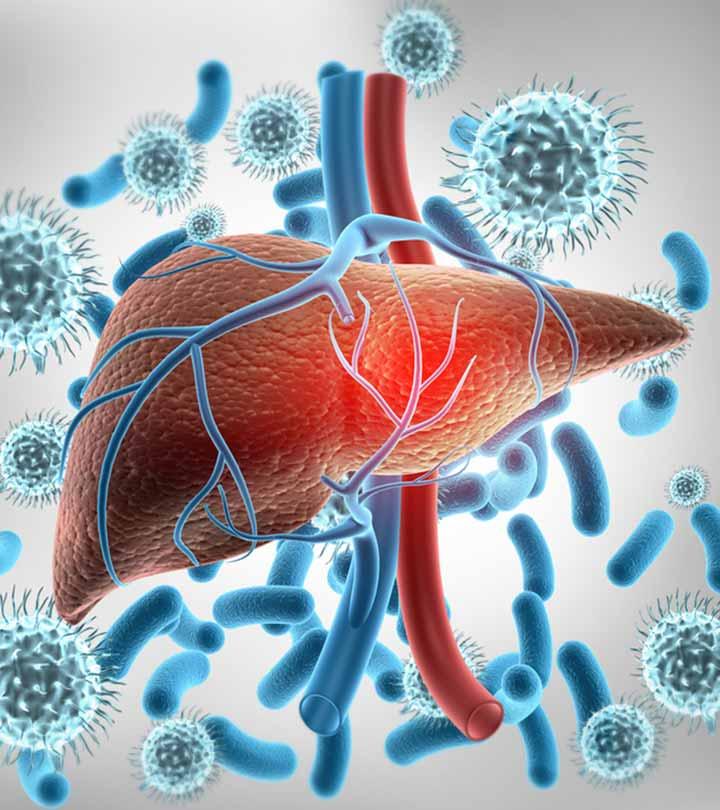Neonatal hepatitis is the inflammation of the liver during early infancy. This usually occurs one or two months after birth. Neonatal hepatitis could be a symptom of liver disease in some babies. However, the precise cause is not identified in many cases.
Nearly 20% of neonatal hepatitis cases occur due to viruses transmitted from the mother before birth or soon after birth(1). Inflammation of the liver cells can obstruct the flow of bile (neonatal cholestasis), and it may result in jaundice. Jaundice and elevated liver enzymes are common features of neonatal hepatitis.
Read this post to know about the causes, symptoms, complications, diagnosis, and treatment of neonatal hepatitis in babies.
Causes Of Neonatal Hepatitis
Neonatal hepatitis can be caused by various reasons that impair liver function. Viruses are one of the common causes of hepatitis in newborns. Other infections, immune problems, anatomical or structural issues, and genetic or metabolic disorders can also contribute to neonatal hepatitis. However, many babies may have hepatitis without a known cause.
The cause of neonatal hepatitis could vary depending on its type.
- Viral neonatal hepatitis: Babies may get various viruses before or immediately after birth. Some of these viruses can cause hepatitis. Hepatitis A, B, and C, rubella (measles), and cytomegalovirus are common viruses that cause hepatitis in neonates(1).
- Hepatitis due to metabolic and genetic conditions: Various inherited metabolic disorders can cause neonatal jaundice. Alpha1-antitrypsin deficiency, Wilson’s disease, cystic fibrosis, and progressive familial intrahepatic cholestasis (PFIC) syndromes are common inherited metabolic disorders of the liver. Neonatal hepatitis can be the beginning stage of these inherited disorders(2).
- Idiopathic neonatal hepatitis: Idiopathic neonatal hepatitis (INH) is when the infant has prolonged cholestasis and other symptoms without a known cause(3). Although the cause is unknown, some babies with INH may have specific histologic findings on liver biopsy. For example, giant cells are seen in liver biopsies in some infants. Giant cells are a fusion of abnormal liver cells, and this type of hepatitis is called idiopathic giant cell hepatitis.
Is Neonatal Hepatitis Contagious?
Not all cases of neonatal hepatitis are contagious or spread to others(4). Neonatal hepatitis caused by metabolic or genetic factors does not spread from one to another. However, neonatal viral hepatitis can be contagious and spread to others in specific conditions. For example, the infections can transmit through the fecal-oral route through unwashed hands.
Signs And Symptoms Of Neonatal Hepatitis
Common signs and symptoms of neonatal hepatitis may include(1):
- Jaundice(yellow eye and skin), usually at one or two months of age
- Poor growth and weight gain due to inadequate vitamin absorption
- Hepatomegaly (liver enlargement)
- Splenomegaly (spleen enlargement)
These signs and symptoms can also be seen in various other conditions in babies. You may consult a pediatrician for an exact diagnosis.
Complications Of Neonatal Hepatitis
Complications of neonatal hepatitis may depend on the cause(5). The following complications are often seen:
- Encephalitis is the infection of the brain that often leads to cerebral palsy and mental retardation in some babies. Infants with neonatal hepatitis due to rubella or cytomegalovirus are more likely to develop encephalitis.
- Liver cirrhosis is often seen in infants with hepatitis lasting more than six months.
- Skin problems such as itching and eruptions are seen in chronic neonatal hepatitis.
- Cholestasis is the decreased bile flow that may occur in neonatal hepatitis, resulting in inadequate vitamin absorption from the intestines.
- Vitamin A, D, E, and K deficiency may occur in some babies. This may result in growth delays, poor bone development, skin changes, and bleeding problems in babies.
Diagnosis Of Neonatal Hepatitis
The presence of jaundice and physical examination helps the doctors identify enlarged liver and spleen in babies. Babies with hepatitis may get a referral to a pediatric gastroenterologist for detailed evaluation. Blood tests are conducted to determine the following parameters (6).
- Elevated bilirubin levels help confirm jaundice.
- Antibody tests help identify the type of hepatitis and severity of infection. It also determines whether the hepatitis is active or dormant.
- Liver enzyme AST/ALT levels in blood show liver function.
- Prothrombin time measures the time required for plasma to clot. This also indicates liver functioning.
- Other specific blood tests may help to identify metabolic conditions.
In addition to the blood tests, doctors may also order imaging tests to visualize the liver. For example, ultrasound and hepatobiliary iminodiacetic acid (HIDA) scan (nuclear medicine test) could provide a detailed view of liver tissues and pathologies. In some cases, a liver biopsy is done to evaluate the tissue changes. These tests are necessary to confirm diagnosis since conditions such as biliary atresia may mimic neonatal hepatitis.
Treatment For Neonatal Hepatitis
There is no specific treatment for neonatal hepatitis in most cases(1). Supportive care and symptom-based management are given during this condition, depending on the cause. Infants may receive vitamin supplementation and formulas containing easily digestible fats to have optimal growth.
Liver transplantation is recommended for babies with severe permanent liver damages. Treatments with antivirals, such as lamivudine and interferon alpha, are usually not approved for infants. However, doctors may recommend certain treatments based on risks and benefits.
Prognosis Of Neonatal Hepatitis
In most cases, neonatal hepatitis may resolve on its own over time. It may take weeks or months to recover from the condition(4). Some may develop mild liver damage (fibrosis), and this may improve over time.
In some babies, neonatal hepatitis due to the hepatitis A virus may resolve within six months(1). However, hepatitis B or C viruses may lead to chronic liver diseases. Some babies with severe liver damage (liver cirrhosis) followed by hepatitis may require liver transplantation.
Neonatal hepatitis can cause jaundice in babies younger than three months. Some cases may resolve themselves without complications, while a few may need lifelong therapies or liver transplantation. You may seek medical care if your baby has any symptoms of neonatal hepatitis for early diagnosis and management.
References:
MomJunction’s articles are written after analyzing the research works of expert authors and institutions. Our references consist of resources established by authorities in their respective fields. You can learn more about the authenticity of the information we present in our editorial policy.



































